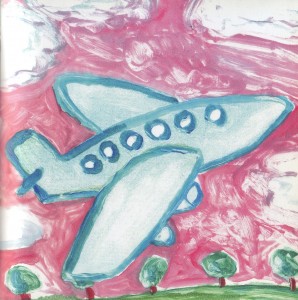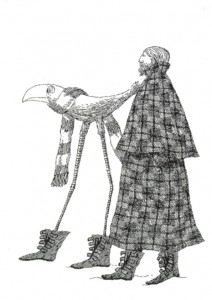A Great Way to End the Day
 Every night of the retreat, at the end of the last sitting, we sang a Metta Chant known as Imaya Dhammanu (which is the first line of the chant and means “By this Practice.”) At first Guy Armstrong and then Bhante Buddharakkhita led the chant, but it soon became clear that one of the yogis (retreatants) had an amazingly beautiful voice, so they quickly turned the lead over to her. On the last night, they recorded us and I wish I could share it with you, but for privacy reasons, it’s only available to attendees. (You can probably google “Imaya Dhammanu chant” and find another recording of it somewhere.)
Every night of the retreat, at the end of the last sitting, we sang a Metta Chant known as Imaya Dhammanu (which is the first line of the chant and means “By this Practice.”) At first Guy Armstrong and then Bhante Buddharakkhita led the chant, but it soon became clear that one of the yogis (retreatants) had an amazingly beautiful voice, so they quickly turned the lead over to her. On the last night, they recorded us and I wish I could share it with you, but for privacy reasons, it’s only available to attendees. (You can probably google “Imaya Dhammanu chant” and find another recording of it somewhere.)
It was such a lovely way to end the evening that I’ve been chanting it here at home every night before going to bed. The chant is in Pali, but here’s what it means in English:
By this practice,
truly in accord with the Dhamma,
I honor the Buddha.
By this practice,
truly in accord with the Dhamma,
I honor the Dhamma.
By this practice,
truly in accord with the Dhamma,
I honor the Sangha.
May I be free from enmity/danger.
May I be free from mental suffering.
May I be free from physical suffering.
May I care for myself happily.
May my mother and father,
teacher, relatives, friends,
and fellow dhamma-farers
be free from enmity/danger,
be free from mental suffering
be free from physical suffering
and may they care for themselves happily.
May all yogis in this forest (place)
be free from enmity/danger,
be free from mental suffering,
be free from physical suffering,
and may they care for themselves happily.
May the guardian deities
of this abode
and this dwelling,
and may the guardian deities
of this forest
be free from enmity/danger,
be free from mental suffering
be free from physical suffering
and many they care for themselves happily.
May all beings,
all creatures,
all living things,
all people,
all beings with bodies,
all females,
all males,
all noble ones,
all who are not noble ones,
all deities,
all humans,
all those in unhappy states,
be free from enmity/danger,
be free from mental suffering,
be free from physical suffering,
and many they care for themselves happily.
May they be free from suffering,
enjoy safety and abundance,
and have kamma as their true property.
May our merit be shared
with all beings.
Well spoken, well spoken, well spoken.
A Good Way to Come Home
 Besides laundry and e-mails and taking care of Elvis, one of the first things I did when I came home from retreat was to go out and find gifts to give…to my teachers Lila and Mirabai who put me up in their homes before and after the retreat, to my sister Gretchen for taking care of Elvis while I was gone, to my brothers Wayne and Matt and my nephew Ryan whose birthdays came and went while I was away, to my friend Michael who got married on the weekend I got back…and probably others who I have yet to think of, who are in need of a gift from me.
Besides laundry and e-mails and taking care of Elvis, one of the first things I did when I came home from retreat was to go out and find gifts to give…to my teachers Lila and Mirabai who put me up in their homes before and after the retreat, to my sister Gretchen for taking care of Elvis while I was gone, to my brothers Wayne and Matt and my nephew Ryan whose birthdays came and went while I was away, to my friend Michael who got married on the weekend I got back…and probably others who I have yet to think of, who are in need of a gift from me.
I didn’t plan for it, but it has turned out to be a tremendous comfort in dealing with the sense of loss and grief I was feeling as Elvis was dying and a wonderful way to come back home to the “real” world of relationships and responsibilities after being gone for so long on a deep, inner journey.
Turning my attention to finding these gifts….thinking of just the right thing to give, wrapping them in a way that would be the most pleasing and imagining them being opened and the delight they will give…has been a great source of joy for me.
I will make a note of this.
The best way to come home is with a generous heart.
May It Be So
 Elvis died over the weekend. He had a good long life and was deeply loved and cared for all the way to the end. His suffering in this life has ended. May he be reborn as a gentle and kind human being.
Elvis died over the weekend. He had a good long life and was deeply loved and cared for all the way to the end. His suffering in this life has ended. May he be reborn as a gentle and kind human being.
Impermanent, As Always
I returned from retreat to find that my sweet, old, lover-boy (cat) Elvis, is near the end of his life…so I am tending to him instead of working diligently on updating Dharma Town. I will post when I can.
Farelong, Oh Crumpleweed
 Note: I will be away on retreat until Oct 24, so there will be no new DharmaTown postings until I return.
Note: I will be away on retreat until Oct 24, so there will be no new DharmaTown postings until I return.
***
At the last Dharma Seed KM meeting before my retreat, one of our members (Roberta!) brought home-made muffins (which she often does!) and this time she decorated one of them (for me!) with a “banner” that read:
Farelong, oh Crumpleweed, our friend! We’ll miss you!
This was especially wonderful since it’s a quote from something my teacher, Lila Wheeler, had read in one of the talks we’ve listened to. (You can hear the talk here.)
Here’s the whole quote:
Whenever I part with my kids or my husband, I always try to say something loving because I imagine a car crash or somebody’s heart giving out, and I don’t want my last words to be impatient or distracted. Neither do I want my “I love you’s” to become automatic. So I’ve been trying to come up with ways to say good-bye that are unique, intimate, and genuine.
For several years when my son was young, he used to say to me, “Farelong, oh Crumpleweed, my friend,” whenever he left the house. I have no idea where he got it. Those are words of good-bye I could live with. — Angelina Citrone, from The Sun magazine
***
So Farelong, oh you Crumpleweeds, my DharmaTown friends. I look forward to connecting with you again when I return.
(image from: A Whole World, by Couprie and Louchard)
Sangha Curry
 The Dancing with Life KM Group added a bit of spice to last Monday night’s session by meeting at the home of one of our members — instead of at our regular meeting place — and having dinner together. We didn’t talk much about the book, but we did talk about our lives and our practice….which, after all, is what Dharma Friendship all about.
The Dancing with Life KM Group added a bit of spice to last Monday night’s session by meeting at the home of one of our members — instead of at our regular meeting place — and having dinner together. We didn’t talk much about the book, but we did talk about our lives and our practice….which, after all, is what Dharma Friendship all about.
We had Chickpea and Spinach Curry over Spicy Indian Rice with Toasted Almonds made from the totally awesome cookbook: Vegan with a Vengeance, by Isa Moskowitz. Here’s the recipe for the curry:
Chickpea and Spinach Curry (serves 6-8)
1 12-oz can whole tomatoes (in juice, not puree)
3 Tbs vegetable oil
2 tsp mustard seeds
1 large onion, cut into 1/4-inch dice (about 2 cups)
4 cloves garlic, minced
2 Tbs fresh ginger, minced
3 tsp curry powder
2 tsp ground cumin
1 tsp ground coriander
1/8 tsp ground cloves
1/2 tsp ground cinnamon
1/4 tsp asafoetida (optional)
3 cardamom pods
1 tsp salt
10 cups fresh spinach, well rinsed and chopped
4 cups chickpeas, cooked and drained, or 2 15-0z. cans, drained and rinsed
Prepare the tomatoes by removing them one at a time from the can, squeezing out the juice, and tearing them into bite-size pieces. Place the prepared tomatoes in a bowl and reserve the juice in the can.
Preheat a medium-size saucepan over moderate heat; pour in the vegetable oil and then the mustard seeds. Let the seeds pop for about a minute (you may want to cover the pot so the seeds can’t escape), then add the onion; turn up the heat to medium-high and sauté for 7 to 10 minutes, until the onion begins to brown.
Add garlic and ginger, and sauté 2 more minutes. Add spices, salt and 1/4 cup of the reserved tomato juice; sauté one minute more. Add tomatoes and heat through. Add handfuls of spinach, mixing each addition until wilted. When all the spinach has completely wilted and the mixture is liquid-y, add the chickpeas.
Lower the heat, cover, and simmer for 10 more minutes, stirring occasionally. Taste and adjust the spices if necessary. Simmer uncovered for about 10 more minutes, or until a thick, stew-like consistency is achieved.
Enjoy with friends!
Invisible Journeys
 One of my all-time favorite books is Invisible Cities, by Italo Calvino. I can’t say that I entirely understand it, but I do love it. I notice that I am often drawn to it when I’m about to start something big–like now, for example–so I thought I’d share a bit of it with you, my Dear Fellow Sojourners.
One of my all-time favorite books is Invisible Cities, by Italo Calvino. I can’t say that I entirely understand it, but I do love it. I notice that I am often drawn to it when I’m about to start something big–like now, for example–so I thought I’d share a bit of it with you, my Dear Fellow Sojourners.
Cities & Desire. 3.
Despina can be reached in two ways: by ship or by camel. The city displays one face to the traveler arriving overland and a different one to him who arrives by sea.
When the camel driver sees, at the horizon of the tableland, the pinnacles of the skyscrapers come into view, the radar antennae, the white and red windsocks flapping, the chimneys belching smoke, he thinks of a ship; he knows it is a city, but he thinks of it as a vessel that will take him away from the desert, a windjammer about to cast off, with the breeze already swelling the sails, not yet unfurled, or a steamboat with its boiler vibrating in the iron keel; and he thinks of all the ports, the foreign merchandise the cranes unload on the docks, the taverns where crews of different flags break bottles over one another’s heads, the lighted, ground-floor windows, each with a woman combing her hair.
In the coastline’s haze, the sailor discerns the form of a camel’s withers, an embroidered saddle with glittering fringe between two spotted humps, advancing and swaying; he knows it is a city, but he thinks of it as a camel from whose pack hang wineskins and bags of candied fruit, date wine, tobacco leaves, and already he sees himself at the head of a long caravan taking him away from the desert of the sea, toward oases of fresh water in the palm trees’ jagged shade, toward palaces of thick, whitewashed walls, tiled courts where girls are dancing barefoot, moving their arms, half-hidden by their veils, and half-revealed.
Each city receives its form from the desert it opposes; and so the camel driver and the sailor see Despina, a border city between two deserts.
Don’t Call It “Retirement”
 I was talking to one of my brothers last night and he kept saying: “I can’t believe you’re retired!” And the thing is, I can’t either…not because it feels shocking to not be getting up and going to work in the morning…but because the word “retired” doesn’t exactly sound like what it feels like I have done.
I was talking to one of my brothers last night and he kept saying: “I can’t believe you’re retired!” And the thing is, I can’t either…not because it feels shocking to not be getting up and going to work in the morning…but because the word “retired” doesn’t exactly sound like what it feels like I have done.
It doesn’t feel like I’m pulling back from something as much as opening up to something.
We talked about it for a long time and I finally came up with a different way to describe what I consider to be my new work status: I’m doing a self-funded, interdisciplinary, post-graduate, independent study program. I think I’ll call it my “post-doc” for short. (OK, I don’t exactly have a doctoral degree, but “post-grad” doesn’t quite capture the “post-ness” of what it feels like I have already accomplished.)
I am embarking upon a program of inner study. Which of course will include a study of the relationship between the internal and external. Travel will, naturally, be required. And field work of all sorts. Perhaps there will even be an internship or two.
The goal of this program?
Wisdom. Contentment. A Life Well Lived.
I’m Going to Walk Outside
 Today is my last day of work — of paid work, I should say. I am retiring and my office gave me a great party yesterday, which was a lot of fun, and of course the inevitable question came up: What are you going to do?
Today is my last day of work — of paid work, I should say. I am retiring and my office gave me a great party yesterday, which was a lot of fun, and of course the inevitable question came up: What are you going to do?
I have a DPP friend, a physician in her 40s I’m guessing, who recently quit her practice for a variety of reasons, none of which are easy to explain but mostly, I suspect, having to do with not being able to do what she feels like needs to be done. When people asked her the “What are you going to do” question, she answered with: “I am going to walk outside.”
I love that.
Partly because that is, literally, what she’s been doing every day since she retired (which she had almost never been able to do while she was employed). And because it suggests getting “outside the box” for a fresh approach, a fresh outlook…and some fresh air!
So that’s what I’m going to do, too.
I’m going on the 6-week retreat in September, and to Burma in January, and I’m going to keep doing all the Dharma Town stuff in between. But maybe even more important that that — as often as possible, I’m going to walk outside.
(image by Edward Gorey)
How to Train the Mind
 Joseph Goldstein will be one of the teachers at the 6-week retreat I’m going to, so I’ve been getting ready by listening to one of his talks every night. He has an absolutely fascinating series of talks — 47 in all! — on the Satipatthana Sutta. (Available on Dharma Seed here.)
Joseph Goldstein will be one of the teachers at the 6-week retreat I’m going to, so I’ve been getting ready by listening to one of his talks every night. He has an absolutely fascinating series of talks — 47 in all! — on the Satipatthana Sutta. (Available on Dharma Seed here.)
The talk I listened to last night was the 4th in this series and he talked a lot about the importance of noticing how everything is always Arising and Passing Away, and about what it means to “Enter the Stream” of Awakening….all of which was wonderful to listen to….but what really struck me was what he called “a way of holding it all in balance,” which he offered at the very end of the talk in the form of a Tibetan practice called The Seven-Point Mind Training:
(1) Consider all phenomena to be dreams.
(2) Be grateful to everyone.
(3) Don’t be swayed by outer circumstances.
(4) Don’t brood over the faults of others.
(5) Explore the nature of unborn awareness.
(6) At all times, simply rely on a joyful mind.
(7) Don’t expect a standing ovation.
(image from: Phantasmagoric Theater Tarot)

